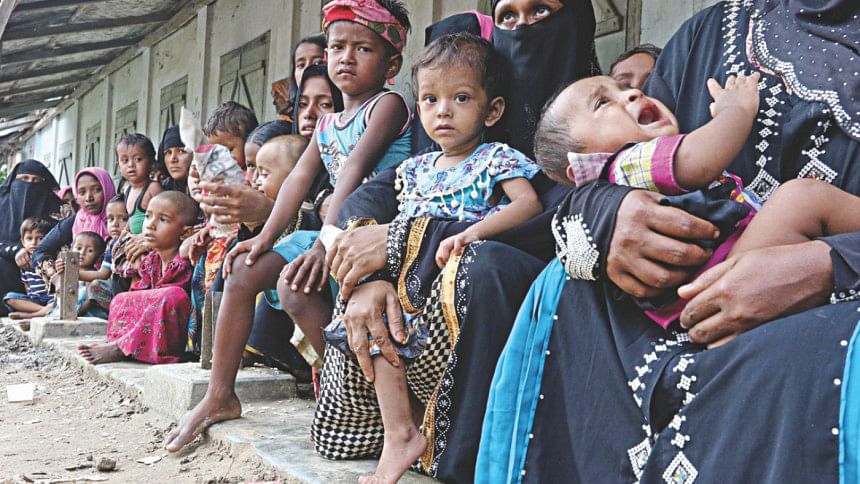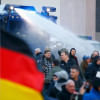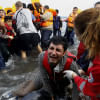Refugees, they are

More than a month has passed since the brutalised and uprooted Rohingya refugees, mostly women, children and the elderly, began arriving in Bangladesh. Their gut-wrenching tales and testimonies covered widely in national and international print and electronic media have stirred the world's conscience. While most states (the powerful ones and those who aspire to be so) dither and weigh their options essentially from myopic national interest perspectives, people around the world, guided by the principles of justice and human dignity, find it revolting that the Burmese state continues to pursue its genocidal agenda with near impunity. They are appalled that more than half a million Rohingyas were expelled from their homeland and are seeking refuge in Bangladesh, joining almost an equal number who were banished since 1991-92.
The lies dished out by the Burmese government and their international apologists hardly swayed international public opinion. Malaysia, Indonesia and Turkey were the first group of countries that condemned the Burmese government and extended support to refugees. Gradually others began to come on board in recognising the gruesome reality of the Arakan region. France condemned the genocide. The UN Security Council (SC) met for a public hearing on the issue after more than eight years. Explaining the gravity of the situation the Secretary General referred to this "world's fastest-developing refugee emergency, a human right and a humanitarian nightmare". The US representative at the SC meeting stressed considering "action against Burmese security forces who are implicated in abuses and stoking hatred among fellow citizens."
The global civil society joined in solidarity with the persecuted Rohingyas. Rallies and demonstrations were held in cities stretching from Grozny and London to Dhaka and Jakarta. The much-respected Permanent People's Tribunal on alleged State Crimes against Rohingyas and other nationalities, at its final session held in Kuala Lumpur on September 18-22, found the Burmese state guilty "of the crime of genocide against the Rohingya". Human Rights Watch and 87 other civil society organisations, in a joint statement to the UNSC and General Assembly on September 29, demanded urgent action from the UN and, citing evidence, stated that "the atrocities committed by the Myanmar state security forces amount to crimes against humanity."
The developments narrated above offer a glimmer of hope that at the very least the world is finally waking up to the reality of crimes that the Burmese state is committing against the Rohingya ethnic minority. While debates continue whether it should be termed as "genocide" or "crimes against humanity" or both, freedom loving people across the world have begun to exert pressure on their respective governments to move beyond "well-meaning diplomatic words". Calls have been made for an arms embargo against the military and sanctions against individuals responsible for crimes and serious abuse, suspension of military assistance, training and other forms of cooperation, and trial of the Burmese leaders in the International Criminal Court. The list also includes putting a stop to sports and cultural ties, downgrading of diplomatic relations, freezing of overseas bank accounts and denying visas to state functionaries who are party to the genocidal activities.
States that champion democracy, freedom and human rights, should start taking immediate action unilaterally rather than linger for the UN to pass a resolution. Given the motivations of some of the permanent members, waiting for a substantive UNSC resolution on Burma's genocidal act would remain a chimera and an exercise in self-delusion.
The world has begun to respond to Bangladesh's call for attention and assistance for the hapless Rohingyas. Such positive response obliges the country to develop a comprehensive, transparent and accountable strategy and implementation mechanism for taking care of Rohingya refugees. Key element here is how Bangladesh views the Rohingyas and how the country would like to project this group to the international community.
A cursory recap of Bangladesh's experience in dealing with the Rohingya problem confirms that both in 1978 and 1991-92, Bangladesh accepted them as prima facie refugees. This is because Rohingyas had crossed the border fleeing wanton persecution of the Burmese military. The scale of the flow and similarity of narratives of survivors left little doubt that all those who came to Bangladesh qualified for refugee status. Putting in place procedures for their individual status determination was deemed superfluous.
In 1978 UNHCR was invited by the government of Bangladesh and assisted with repatriation. For the record, sending back refugees under sub-optimal protection mechanism took a huge toll on refugees as thousands perished on their return. During 1991-92, as the refugees were fleeing persecution and violence, the Bangladesh government rightly termed Rohingyas as refugees. This was done long before the UNHCR was involved in the operation.
Since 2012 the Bangladesh government stopped any new registration of refugees. The purported aim was to stem further inflow. The government felt that extending refugee status would become a pull factor. For the same reason, the government effectively shunned any move for third country resettlement of refugees and also put on hold education programmes for Rohingya children until 2006.
Subsequent developments debunked the veracity of the government's position. Refugees kept coming, despite non-recognition. This was so because Burma no longer sent refugees with bullet or bayonet wounds, it began with what has been termed as "slow genocide", creating conditions through destroying identity and livelihood, by creating obstacles through arbitrary and discriminatory laws and procedures under which Rohingyas could no longer sustain a livelihood. The incoming refugees were no economic migrants; they were the victims of systemic state policy of persecution and genocide.
In the absence of any protection mechanism the refugees fended for themselves. The absence of legal status made them vulnerable to exploitation, abuse, servitude and trafficking. The Bangladesh government made little effort to examine why Rohingyas were coming. Fixation of successive governments in pursuing "look east" and "constructive engagement" policies yielded little result and kept the Rohingya problem simmering. Those tasked with bilateral negotiations with Burma perhaps felt that the "residual caseload" of registered refugees should be addressed first, before bringing in the thorny issue of the "new arrivals". It is in this context that subsequent flows occurred, the largest among them was the post August 25, 2017.
While visiting them in Cox's Bazar, the prime minister expressed her solidarity with "Rohingya refugees". But, surprisingly, the official narrative presents them as "infiltrators" (anuprobeshkari), "illegal Myanmar nationals" and "forcibly displaced Myanmar nationals". The government appeal to the people to donate in an account of Sonali Bank is titled "Humanitarian Assistance to the Myanmar Citizens Illegally Migrated (Rohingya)."
One wonders what keeps the government away from terming Rohingyas refugees? What is there to gain by labelling them as they are being labelled now? All Rohingyas in Bangladesh, including those in and outside camps, who have come before or after August 25, 2017, adequately fulfil the stiff criteria stipulated in the 1951 Refugee Convention. Article 1 (A) of the Convention defines a refugee as "A person who owing to a well-founded fear of being persecuted for reasons of race, religion, nationality, membership of a particular social group or political opinion is outside the country of his nationality and is unable or, owing to such fear, is unwilling to avail himself of the protection of that country…".
Don't the pundits who make the decisions know that acknowledging them as refugees will accord them rights; foremost among them is the right to return. It also obligates the international community for "burden sharing".
One also fails to understand why the UN mandated refugee agency the UNHCR, has been denied the lead counterpart role when clearly it is a refugee crisis that Bangladesh faces and tied up with it is the question of statelessness. Over the years, after working in various parts of the world, the agency has developed the capacity, expertise and competence in coordinating mass influx refugee emergency responses. Assigning such a delicate task to an agency which does not have the mandate or the expertise, nor is covered under the UN normative framework, will be a monumental mistake.
Last Friday at a meeting in Dhaka, the Foreign Secretary acknowledged that Rohingyas are fleeing persecution and have taken shelter in Bangladesh. He went to say, "But, we do not want to call them refugees. And, we have a strong logic behind this."
Would the honourable Secretary please spell out the baffling logic?
CR Abrar teaches International Relations at the University of Dhaka.










Comments